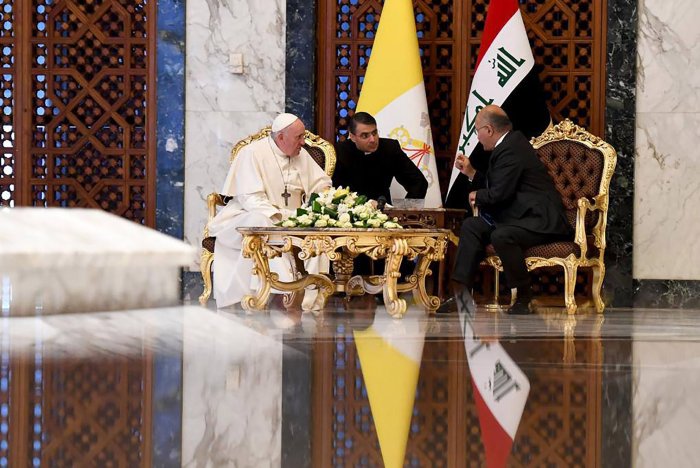Pope Francis (L) speaks with Iraq's President Barham Salih (R) before departing for Rome at Baghdad International Airport on Monday. Photo courtesy of Iraqi president's press office |
License Photo
March 6 (UPI) -- Pope Francis visited Ur, the biblical birthplace of the prophet Abraham, on his second day in Iraq on Saturday.
Francis held an interreligious meeting at the Plain of Ur, where Abraham, a common patriarch of Judaism, Christianity and Islam, is believed to have been born.
The Ziggurat of Ur, a Sumerian temple, was visible as a backdrop during the pope's live streamed address.
"The blessed place brings us back to our origins, to the sources of God's work, to the birth of our religions," Francis said at the meeting. "Here, where Abraham our father lived, we seem to have returned home. It was here that Abraham heard God's call; it was from here that he set out on a journey that would change history. We are the fruits of that call and that journey."
Francis called for peace and love, bringing a dream of Pope John Paul II -- who planned to visit Iraq before rising tensions forced him to cancel more than 20 years ago -- to fruition, The New York Times reported.
"From this place, where faith was born, from the land of our father Abraham, let us affirm that God is merciful and that the greatest blasphemy is to profane his name by hating our brothers and sisters," Francis said during the meeting. "Hostility, extremism and violence are not born of a religious heart: they are betrayals of religion."
The service is set to be one of the most significant moments in the pope's three-day historic trip to Iraq, highlighting the archaeological wonder of Ur, The Middle East Eye reported.
Ur, thought to date back to 3800 B.C., was the capital of the Sumerians, who traded around Mesopotomia. The Ziggurat was a place of worship dedicated to the moon god Nanna, patron deity of Ur. It consists of a three-layered solid mass of mud brick faced with burnt bricks set in bitumen. The lower layer is part of the original construction, and upper two are part of neo-Babylonian restorations in the sixth century BC. In the 1980s, the facade and monumental staircase were restored under Iraqi dictator Saddam Hussein.
British archaeologist Leonard Woolley excavated the remains of the Ziggurat in the 1920s and 1930s.
Woolley found a cylindrical seal in the complex adjacent to the Ziggurat which bore Abraham's name, and led him to believe the complex, dating from around 1900 BC, was Abraham's house.
"As long as Ur is the birthplace of Abraham, it is an important site for all people around the world, all religions," Amer Abdul-Razzaq, director of Nasiriyah Museum of Civilization, told MEE.
Francis arrived Friday for the three-day historic visit to the Middle Eastern nation, which is considered one of the most dangerous countries on earth, and met with the prime minister and president.
The pope said he felt compelled to make the trip to Iraq because its people "have suffered so much," amid the COVID-19 crisis.
An estimated 500,000 Christians live in Iraq, a number that has declined with the fall of Hussein from as many as 1.5 million in 2003, The Times reported.















